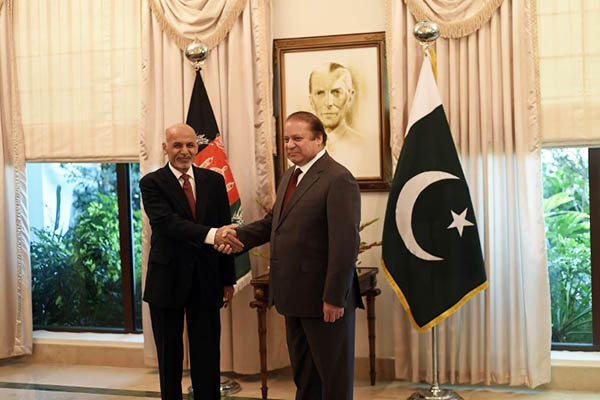
Farooq Naeem—AFP
Leaders of neighboring nations agree to double trade by 2017 and work together on the TAPI pipeline.
Pakistan and Afghanistan pledged to begin a new era of economic cooperation on Saturday, with Afghan President Ashraf Ghani saying three days of talks had ended 13 years of differences.
Ghani and Prime Minister Nawaz Sharif said collaboration on economic and energy issues would form the basis of better security in the troubled region as U.S.-led NATO combat troops leave Afghanistan after more than a decade of fighting the Taliban.
The two countries have long endured testy relations, with former Afghan president Hamid Karzai regularly accusing Pakistan of supporting Taliban insurgents trying to overthrow his regime. Pakistan has accused Kabul of not doing enough to shut down bases on its soil for militants attacking Pakistani targets.
The fact that Ghani chose to make Islamabad the destination for his first bilateral visit since taking power in September is seen as an important sign of wanting to improve ties. The former World Bank economist arrived in Islamabad on Friday but aides had begun negotiations with Pakistani officials a day earlier.
After talks between Ghani and Sharif on Saturday, the two sides’ finance ministers signed a deal aimed at more than doubling trade between the two countries to $5 billion by 2017, as well as simplifying customs protocols. “I want to welcome the enormous steps that have been taken in the last three days to achieve progress on the economy,” Ghani said at a joint news conference with Sharif afterwards. “We have overcome obstacles of 13 years in three days,” he said in an apparent dig at the troubles of the Karzai era.
The Afghan leader, who took the presidency in a power-sharing government after a protracted and bitter election battle against rival Abdullah Abdullah, said cooperation on gas and energy projects would be key. “What we have agreed on is a shared vision where Pakistan and Afghanistan would serve as the heart of Asia to ensure that economic integration in Asia becomes a reality,” he said.
The two sides plan to work together on the CASA-1000 electricity line and the ambitious $7.6 billion dollar Turkmenistan-Afghanistan-Pakistani-India (TAPI) gas pipeline. The 1,800-kilometer TAPI project aims to link the gas fields of Central Asia to energy-hungry markets in Pakistan and India, with international giants ExxonMobil, Chevron, Petronas, BP and Total all interested, according to sources.
“Today we have taken fundamental steps to ensure that South Asia connects with Central Asia and Central Asia connects to South Asia,” Ghani said.
Pakistan was one of only three countries to recognize the Taliban regime that was ended by the 2001 U.S.-led invasion and the cooperation of Islamabad—and importantly its military—are seen as crucial to long-term stability in Afghanistan. Pakistan, meanwhile, has long been concerned about the influence of rival India in Afghanistan, fearing “encirclement” on its western border.
As well as government officials, Ghani also met Pakistan Army chief General Raheel Sharif on Friday, just a week after the general had been in Kabul for talks.
On Saturday P.M. Sharif reiterated Pakistan’s desire for stability in Afghanistan and support for the reconciliation process to achieve peace. Pointing to Pakistan’s wariness about outside mediation, Sharif stressed that reconciliation efforts should be “fully Afghan-led and Afghan-owned.”
